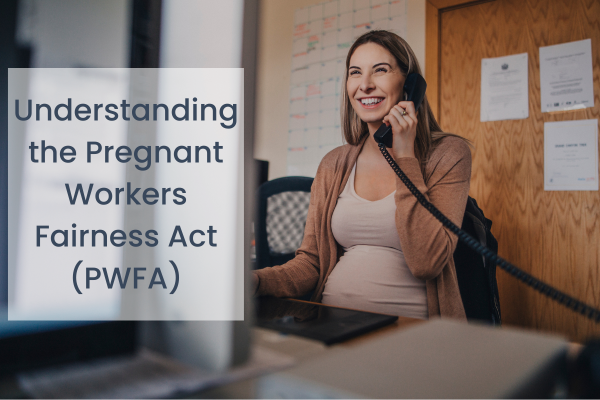
The Pregnant Workers Fairness Act (PWFA) is a transformative law designed to ensure that pregnant employees receive equitable treatment at work. This law mandates that employers provide the necessary adjustments or accommodations that pregnant workers need due to pregnancy, childbirth, or related medical conditions.
Effective Dates:
The PWFA was enacted on June 27, 2023, with rules for implementation starting June 18, 2024.
Who is covered?
- Private sector employers with 15 or more employees.
- Public sector employers, including state and local governments.
- The U.S. Congress and federal agencies.
- Employment agencies and labor organizations.
Who is exempt?
Businesses with fewer than 15 employees do not fall under the PWFA’s requirements.
Key Requirements of the PWFA:
- Employers must provide reasonable accommodations such as more frequent breaks, modified work equipment, or flexible work hours unless such changes would cause undue hardship.
- Employers cannot coerce pregnant workers to accept an unwanted accommodation.
- Employment opportunities cannot be denied due to a worker’s need for accommodations.
- Pregnant workers cannot be forced to take leave if other accommodations are available.
- Retaliation against employees for requesting or using accommodations is prohibited.
These provisions help create a supportive work environment critical for the health and job security of pregnant workers.
Why Doulas Should Discuss the PWFA
Doulas, as advocates for perinatal health, are ideally positioned to inform their clients about workplace rights under the PWFA. Understanding these protections enables doulas to better support clients in navigating the demands of their workplaces during and after pregnancy.
Supporting Maternal Health:
- Reducing physical exertion and stress through workplace accommodations can decrease the risk of health complications, potentially impacting maternal mortality rates, especially in communities of color.
- Facilitating access to medical appointments through flexible scheduling supports ongoing prenatal and postnatal care, essential for the health of the birthing person and the baby.
Encouraging Continued Lactation:
The PUMP Act and the Break Time for Nursing Mothers law are crucial for postpartum individuals who wish to continue breastfeeding. These laws require employers to provide reasonable break times and private spaces (other than bathrooms) for expressing breast milk, supporting the health and bonding of parent and child. (These are separate from the PWFA but it’s important to mention them here as well.)
Enhancing Emotional Well-being:
Educating clients about their rights under the PWFA can alleviate stress associated with balancing work and pregnancy, fostering a healthier emotional state.
Practical Accommodation Examples:
- Adjustable Workstations: Supply adjustable desks or chairs to alleviate discomfort during long periods of sitting or standing.
- Access to Necessities: Allow access to water and snacks, particularly important for staying hydrated and managing energy levels.
- Reduced Physical Tasks: Offer assistance with or alternatives to physically demanding tasks, such as lifting heavy objects or extensive walking.
- Flexible Breaks: Provide options for taking shorter, more frequent breaks or longer breaks, depending on the individual’s needs.
- Remote Work Opportunities: Extend opportunities for remote work or more flexible scheduling to accommodate fluctuating energy levels and medical needs.
- Protection from Harsh Conditions: Limit exposure to extreme temperatures and hazardous materials, which can be particularly risky during pregnancy.
How can this information be used?
For doulas, discussing the PWFA is about providing holistic support that addresses the physical, emotional, and professional aspects of a client’s pregnancy journey. By empowering clients with this knowledge, doulas affirm their role as trusted advisors, ensuring that pregnant and postpartum individuals receive the comprehensive support they deserve.
Share these insights through social media (tool kit available), client consultations, or community workshops to raise awareness and empower more individuals to advocate for their needs during and after pregnancy.







